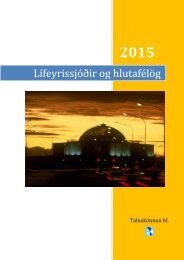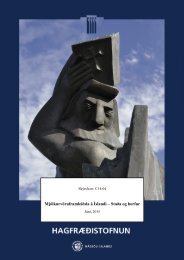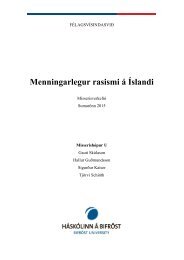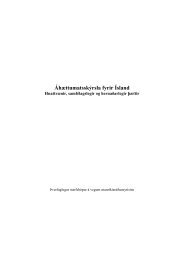Create successful ePaper yourself
Turn your PDF publications into a flip-book with our unique Google optimized e-Paper software.
WORLD REPORT 2016<br />
HUMAN RIGHTS WATCH<br />
These actors rarely issued public statements pushing for progress on accountability.<br />
The EU, Guinea’s biggest donor, financed projects in justice, security sector reform,<br />
transport, and Ebola relief. In the aftermath of the 2014 Ebola crisis, multiple<br />
international donors significantly increased their development aid to Guinea.<br />
Additional funding announced in 2015 included €450 (US$749) million from the<br />
EU and $37.7 million from the International Monetary Fund, as well as $650 million<br />
from the World Bank for Guinea, Liberia, and Sierra Leone. The EU and the<br />
UN Development Programme took the lead in providing support to strengthen<br />
Guinea’s judicial system and in security sector reform.<br />
The country office of the UN High Commissioner for Human Rights regularly documented<br />
abuses, monitored detention conditions, and supported the Human<br />
Rights Commission, but failed to publicly denounce human rights concerns. In<br />
September, UN Special Representative on Sexual Violence in Conflict Zainab<br />
Bangura whose office continued to support accountability for crimes committed<br />
during the 2009 stadium massacre and rapes, visited Guinea to encourage further<br />
progress on investigation.<br />
Guinea underwent Universal Periodic Review at the UN Human Rights Council in<br />
January 2015. UPR recommendations addressing torture, enforced disappearance,<br />
unlawful detention, prison conditions, judicial and security reform, impunity<br />
within the security forces, and women’s and children’s rights were<br />
accepted by Guinea in June.<br />
The UN Peacebuilding Commission funded programs supporting security sector<br />
reform, reconciliation, and conflict prevention in Ebola-affected regions. After<br />
the February killing in Conakry of the UN peacebuilding fund coordinator in what<br />
the government alleged was a criminal assault, the PBF deployed a mission to<br />
Conakry to push for the killing to be investigated.<br />
The International Criminal Court (ICC), which in October 2009 confirmed that the<br />
situation in Guinea was under preliminary examination, continued to engage the<br />
national authorities on progress in the investigation and the importance of conducting<br />
proceedings within a reasonable time frame. ICC Prosecutor Fatou Bensouda<br />
visited the country in July to assess progress, marking the second visit by<br />
her office in 2015.<br />
Haiti<br />
The terms of the majority of lawmakers in Haiti ended in January 2015 without<br />
new elections to replace them, shutting down the parliament. While President<br />
Michel Martelly governed pursuant to constitutional provisions permitting government<br />
institutions to continue operations, the lack of a legislature and protracted<br />
political stalemates over elections hindered the Haitian government’s<br />
ability to meet the basic needs of its people, resolve longstanding human rights<br />
problems, or address continuing humanitarian crises.<br />
As of June, only 3 percent of internally displaced persons (IDPs) living in camps<br />
in the aftermath of the 2010 earthquake remained, according the International<br />
Organization for Migration. Authorities, however, failed to assist many of the remaining<br />
60,000 IDPs to resettle or return to their places of origin, and many continued<br />
to face environmental risks and the threat of forced evictions.<br />
Haiti’s cholera epidemic, which has claimed more than 9,500 lives and infected<br />
over 770,000 people in five years, surged in the first four months of 2015 following<br />
a significant decrease in 2014. There were more than 20,500 suspected<br />
cases and 175 deaths as of August 1.<br />
A controversial regularization plan for foreigners in neighboring Dominican Republic<br />
caused an influx of thousands of Haitians and Dominicans of Haitian descent<br />
into Haiti; authorities were ill-prepared to meet their humanitarian needs.<br />
Elections<br />
At time of writing, nearly all elected national and local positions were open or<br />
filled by appointees; the only exceptions were the president and one-third of<br />
Haiti’s senators. Negotiations between the provisional electoral council, executive<br />
branch, and political parties culminated in a March presidential decree mandating<br />
three election dates: first-round legislative elections on August 9;<br />
second-round legislative, first-round local and municipal, and presidential elections<br />
on October 25; and a presidential run-off election on December 27.<br />
Haitian human rights groups raised concerns about some acts of violence in the<br />
pre-election period. They also documented irregularities in the August elections,<br />
286<br />
287










